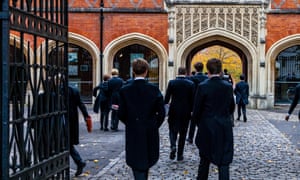
From a 21st-century perspective, the term “public schools” is a semantic puzzle: what is “public” about a private, fee-paying school? But Winchester, Eton, St Paul’s and Westminster all started out as philanthropic institutions whose statutes expressly excluded the children of the wealthy. Moneyed interests forced their way in, and fee-paying pupils outnumbered free scholars by the 15th century; in 2017, only 1% of pupils attending independent schools paid no fees at all. In order tojustify their charitable status – which confers tax advantages worth an estimated £2.5bn per year – independent schools are legally required to do a modicum of work “for the public benefit”, but a 2011 court ruling held that it is up to their own trustees, not the government, to determine whether they have met this criterion.
“The public schools were founded to educate the poor and ended up serving the interests of the rich,” Robert Verkaik writes in Posh Boys, a trenchantj’accuse against what he calls the “apartheid education system” that perpetuates social inequality in modern Britain. Research suggests the standard of teaching in the private sector is not significantly higher than in the state sector: parents “are really paying for smaller classes … and a place in the privilege network”. Public schools are steeped in an oppressive culture of hierarchy and domination – the now obsolete practice of “fagging”, whereby senior pupils used younger ones as servants, persists in attenuated form in the prefect system – but the pay-off is substantial. As Evelyn Waugh’s Grimes puts it in Decline and Fall: “One goes through four or five years of perfect hell at an age when life is bound to be hell anyway, and after that the social system never lets one down.”

Verkaik cites the career of David Cameron as a textbook example of old boy “chumocracy” at work – Tim Farron observed that Cameron’s resignation honours list was “so full of cronies it would embarrass a medieval court” – but his critical scrutiny is not restricted to the Tories. Jeremy Corbyn, he reminds us, attended the kind of prep school where a boy could be flogged for “having your cap at a rakish angle”; Momentum media strategist James Schneider was also privately educated, as were Labour apparatchiks Seumas Milne and Jon Lansman. Verkaik contends that the preponderance of “inflated egos” with “an innate sense of entitlement and … an almost pathological willingness to risk everything” accounts for the adversarial and polarising tendencies in contemporary politics.
The middle of the last century was the last time the political establishment gave serious consideration to tackling the problem of public schools. In the interwar era, thinkers such as George Bernard Shaw and RH Tawney advocated the introduction of an integrated national system of education. Such was the clamour for change that even Winston Churchill was making noises about it in 1940, but a number of reform initiatives in the postwar years ultimately came to nothing. Tony Blair’s government rejected a proposal to do away with public schools’ tax exemptions on the grounds that the resultant loss of income would limit their altruistic capacity, thereby denying access to some less well-off children. This epitomised New Labour’s ideological trade-off, offering the sop of social mobility in exchange for the preservation of the status quo. Blair garbed his stance in the rhetoric of class, arguing that old-school socialists were elitist “intellectual types” who wanted to keep the aspirational middle classes in their place.
Verkaik’s book is a timely intervention that asks all the right questions. For all its supposed radicalism, Corbyn’s 2017 manifesto went no further than proposing to abolish the VAT exemption on school fees. The kind of radical upheaval Verkaik would like to see – “a slow and painless euthanasia” whereby the privileges of the private sector are slowly whittled away – is well beyond the mainstream political pale. He makes a persuasive case, but his prediction that “in a post-Brexit, populist world, an education policy of inaction may no longer be an option” seems like wishful thinking. The much-vaunted “populism” of Brexit was driven by powerful vested interests, without whose machinations there would never have been a referendum. There is no equivalent lobby for radical reform of the independent schools; on the contrary, the overwhelming majority of people in positions of influence are content with, and invested in, the present state of affairs.
Verkaik’s book is nonetheless a timely intervention that asks all the right questions. Its sweep is impressively broad, encompassing everything from child abuse scandals to concerns about money laundering amid the recent influx of oligarch wealth. Verkaik dismantles the myth that Britain owes its strong military tradition to the public schools: contrary to the quote that has been misattributed to Wellington, Eton didn’t own any playing fields at the time of the battle of Waterloo; the Royal Navy, which sustained Britain’s imperial might, was run by people from relatively humble backgrounds.
There is a brief but insightful cameo from the comedian David Baddiel, who explains that, for Jews and other minorities, a public school education is as much about assimilation as climbing the social ladder. Posh Boys is, for a book about public schools, decidedly comprehensive.
No comments:
Post a Comment